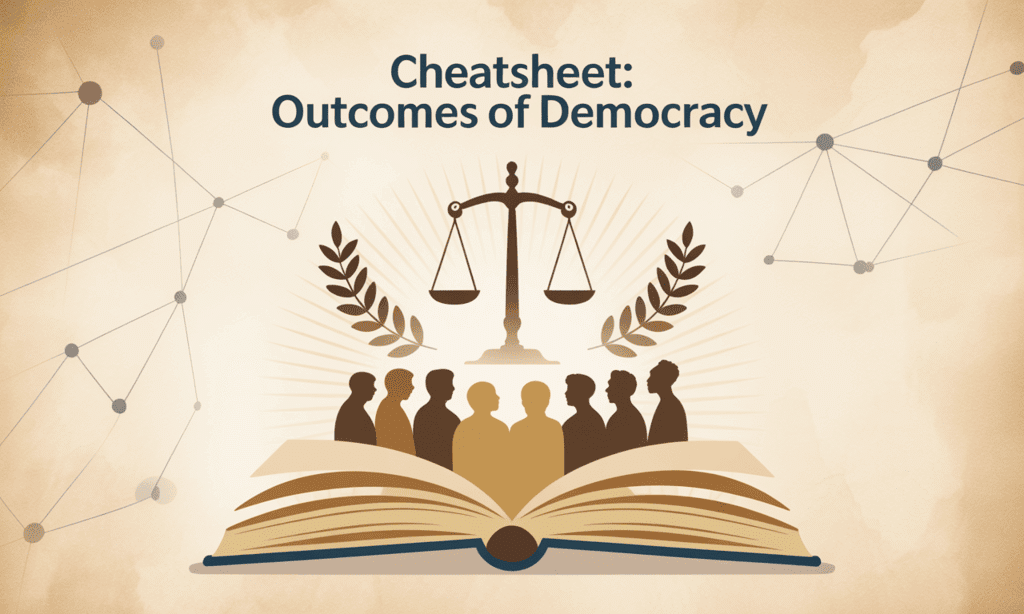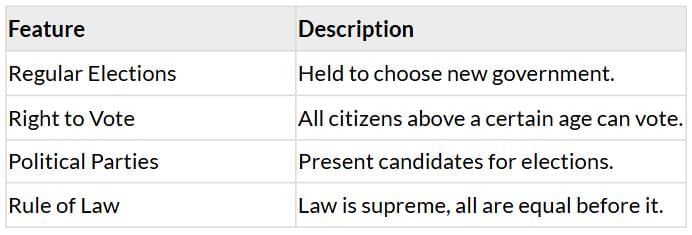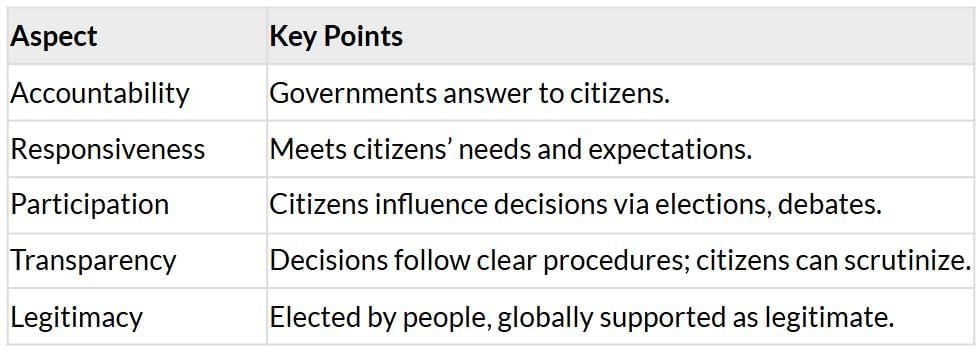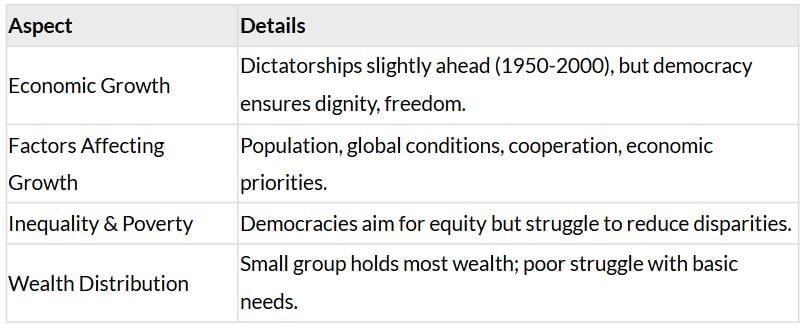Class 10 Exam > Class 10 Notes > Social Studies (SST) Class 10 > Cheatsheet: Outcomes of Democracy
Cheatsheet: Outcomes of Democracy | Social Studies (SST) Class 10 PDF Download
| Table of contents |

|
| What is Democracy? |

|
| Assessing Democracy’s Outcomes |

|
| Why Democracy? |

|
| Political Outcomes |

|
| Economic Outcomes |

|
| Social Diversity |

|
| Dignity and Freedom |

|
| Continuous Evaluation |

|

What is Democracy?
Definition: A system where people hold ultimate power, participate through voting, and elect representatives.
Key Features:
- Individual Freedoms: Express yourself and make choices.
- Equal Representation: Every citizen’s voice matters.
- Protects Human Rights: Ensures basic rights and freedoms.
Assessing Democracy’s Outcomes

Why Democracy?
- Promotes equality.
- Enhances individual dignity.
- Improves decision-making quality.
- Resolves conflicts.
- Allows mistake correction.
Dilemma: Valued in principle but often criticized in practice.
Political Outcomes

- Decision-Making: Based on deliberation and negotiation, ensuring fairness.
- Citizen Involvement: Free elections, open debates, and right to information.
Economic Outcomes

- Reality: Political equality exists, but economic inequality persists.
- Global Context: Poorer nations often rely on aid for basic supplies.
Social Diversity
Democratic Approach: Balances majority rule with minority rights to manage conflicts.
Key Conditions:- Majority must cooperate with minorities.
- No single group should dominate.
- Belgium: Manages diversity via federalism, giving autonomy to linguistic groups.
- Sri Lanka: Ethnic conflict due to poor handling of minority concerns.
Dignity and Freedom
Democracy’s Role:- Promotes individual dignity and freedom.
- Addresses conflicts arising from lack of respect.
- Women’s Dignity: Historically male-dominated societies; democracy pushes for equal treatment.
- Caste in India: Empowers disadvantaged groups to claim equality.
- Foundation: Legal and moral support for freedom and dignity stronger in democracies.
Continuous Evaluation
- Ongoing Assessment: Democracy constantly evolves; new challenges arise as old ones are met.
- Public Complaints: Sign of success—shows people are aware and engaged.
- Citizen Transformation: From subjects to active citizens who believe their vote matters.
- Fosters equality.
- Uplifts dignity.
- Enhances decision-making.
- Resolves conflicts effectively.
The document Cheatsheet: Outcomes of Democracy | Social Studies (SST) Class 10 is a part of the Class 10 Course Social Studies (SST) Class 10.
All you need of Class 10 at this link: Class 10
|
66 videos|614 docs|79 tests
|
FAQs on Cheatsheet: Outcomes of Democracy - Social Studies (SST) Class 10
| 1. What is democracy and how is it defined? |  |
Ans.Democracy is a system of government where power is vested in the people, who exercise that power directly or through elected representatives. It is characterized by principles such as free and fair elections, the rule of law, and the protection of individual rights and freedoms.
| 2. What are the key political outcomes of democracy? |  |
Ans.Key political outcomes of democracy include increased political participation, accountability of leaders, protection of human rights, and the establishment of a system of checks and balances. These outcomes help ensure that government actions reflect the will of the people and maintain the rule of law.
| 3. How does democracy impact economic outcomes? |  |
Ans.Democracy can positively affect economic outcomes by promoting stability, encouraging foreign investment, and fostering an environment where innovation can thrive. Democratic governments tend to prioritize public welfare and economic policies that aim for equitable growth, which can lead to improved living standards.
| 4. In what ways does democracy support social diversity? |  |
Ans.Democracy supports social diversity by allowing for the representation of various groups and voices within the political system. It encourages dialogue and collaboration among different communities, promoting tolerance and respect for diverse perspectives, which can lead to social cohesion and inclusiveness.
| 5. Why is dignity and freedom significant in a democracy? |  |
Ans.Dignity and freedom are fundamental in a democracy as they ensure that individuals can live with autonomy and respect. A democratic society upholds these values by protecting individual rights, providing avenues for self-expression, and allowing people to participate in the decision-making processes that affect their lives.
Related Searches




















